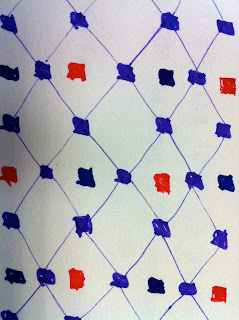In order to create a system out of my stomata, I decided to
focus on the patterns that are created when rain falls on a body of water. The ripple affect in particular is what
I decide to use as inspiration for my system. Each drop of water creates a different size ripple and as
multiple drops fall together the rings overlap and some over power others.
I would begin this building skin system or awning system
with a field of stomata. Within
the field each of the stomata has a sensor on it that is either affected by
light if it is a building skin or by water if it is an awning system. Each of the stomata’s sensors is
slightly different and would close at a different rate. Some sensors would be very sensitive
and would cause the stomata to close with very little heat/light or water. Other sensors would be less
sensitive. Those sensors would
require more heat/ light or more water to cause them to close. There would also be varying degrees of
sensitivity in between. I would
position these different sensors on the field in order to create a certain
rippling pattern as they begin to close.
The most sensitive sensors would be placed in the center with a ring of
slightly less sensitive censors around them and an even less sensitive ring of
sensors around those. These
groupings would vary in size and placement so that the ripples would overlap
and meet to create and organic pattern.
The panels on the face of this building are full of a series
of tiny metallic discs that are pinned in the center. As the wind blows, each of these little discs flutter in
place. As the wind blows the face
seem so to come alive and unique patterns move along the entire façade of the
building.
If I choose to use this system for a building system, it
would be used as a way to shade the building from direct sunlight. On mild days or over cast days all or
most of the stomata would be left open to allow the building to be naturally
lit. On warm days or the stomata
would begin to close to help shade the building. If I decide to use this system as an awning for an outdoor
space I would want it to react to water because the stoma and their guard cells
operate based on how much water they are holding. When no water is present all of the stomata are open,
allowing sunlight to pass through.
When it begins to drizzle, select stomata begin to close. If the rain continues and begins to
rain harder more of the stomata begin to close until it is finally a solid
awning.
The openings for the individual stomata’s are controlled by
a series of ribs or fingers that retract.
As the each pull apart the tensile like structure that covers them pulls
back to create the opening. When
the sensors are triggered the fingers slacken and fall shut.
















